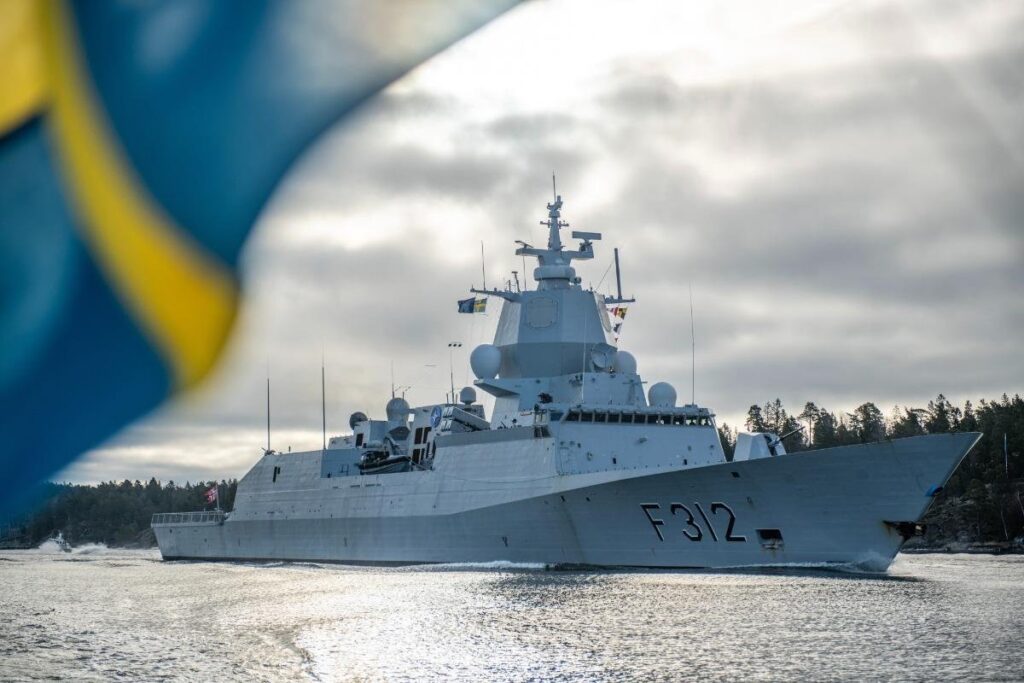In a significant move, Sweden has announced its first military contribution to NATO since joining the alliance in March 2024. This new commitment comes amid rising tensions in the Baltic Sea region, particularly due to growing concerns over potential Russian activities targeting vital underwater infrastructure.
Sweden’s Military Contribution
Sweden is deploying a substantial military presence to enhance NATO’s operations in the Baltic Sea. The Swedish Armed Forces will send up to three warships and an ASC 890 surveillance aircraft to bolster NATO’s maritime security efforts. The Swedish coast guard will also contribute four ships, with an additional seven vessels on standby to provide further support as needed. These measures aim to enhance the security of undersea cables and pipelines critical to the energy and communication infrastructure of Europe.
Background of Sweden’s NATO Membership
Sweden’s decision to join NATO was a historic shift in its long-standing policy of military neutrality. Following Russia’s full-scale invasion of Ukraine in 2022, Sweden’s security concerns grew, prompting the nation to seek NATO membership alongside Finland. In March 2024, Sweden officially became NATO’s 32nd member, marking a major change in its defense strategy and regional security outlook.
The Strategic Importance of the Baltic Sea
The Baltic Sea holds immense strategic significance. It is a vital trade route that connects numerous countries including Denmark, Estonia, Finland, Germany, Latvia, Lithuania, Poland, and Russia. Additionally, the Baltic Sea is home to key undersea cables and energy pipelines that are crucial for the region’s energy security. In recent years, these underwater infrastructures have become targets of potential sabotage, raising alarms about the vulnerability of the region.
Recent Incidents in the Baltic Sea
In 2023, at least ten undersea cables in the Baltic Sea were damaged, affecting several European countries. Some of these incidents involved ships suspected of dragging their anchors, heightening fears of intentional disruptions to critical infrastructure. Given these developments, the urgency for a more robust NATO presence in the Baltic has become evident, and Sweden’s contribution to the alliance is seen as an important step towards ensuring regional stability and security.
Sweden’s Stance on Conflict
Despite its active role in NATO’s defense efforts, Swedish Prime Minister Ulf Kristersson recently emphasized that Sweden is not at war, but also not in a state of peace. This reflects the ongoing tensions in the region and the necessity for continued vigilance. Sweden’s military support to NATO in the Baltic Sea underscores the country’s proactive stance in safeguarding both its national and regional security interests.
The Future of NATO and Baltic Security
Sweden’s contribution to NATO’s operations in the Baltic Sea marks the beginning of a new chapter in the region’s security dynamics. With Sweden’s active participation, NATO’s ability to respond to potential threats and safeguard critical infrastructure in the Baltic will be significantly strengthened. As tensions continue to rise in the region, Sweden’s role in NATO is likely to expand, leading to increased cooperation and a more coordinated defense strategy among Baltic Sea countries.
Sweden’s proactive approach to NATO’s security efforts in the Baltic is not only crucial for the nation’s defense but also plays a pivotal role in maintaining stability and peace in Northern Europe. With further collaboration expected, the region’s security outlook looks increasingly resilient in the face of potential threats.
Also Read: Germany Reports First Foot-and-Mouth Disease Outbreak in 40 Years
Disclaimer
This article is for educational purposes, focusing on the relevance of the topic for UPSC aspirants. Students should stay updated on further developments and refer to official sources for comprehensive preparation.
Follow Fusion IAS

